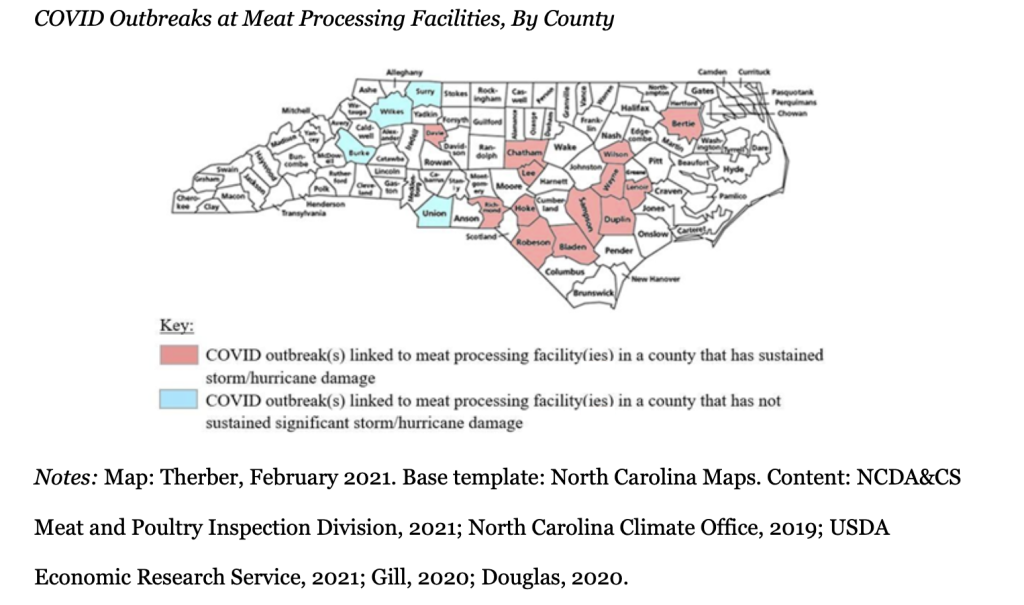Extreme Weather and COVID-19: Organizational Responses
En español aquíThe complex river system and the low-lying geography accompanied by land degradation from agriculture makes the region severely prone to flooding, which has been exacerbated by a higher frequency and intensity of hurricanes and tropical storms. Creating mitigation strategies and providing disaster recovery in the Eastern North Carolina region are critical for combatting the effects from hurricanes.
However, what do we do when a community experiences multiple disasters at the same time? How can mitigation strategies contemplate environmental disasters and global pandemics?
 Sophie Therber, a recent UNC Chapel Hill graduate of highest honors in Human Development and Family Studies Bachelor of Arts and Global Studies Bachelor of Arts, sought to analyze those questions in her Honors Thesis titled “Extreme Weather and COVID-19: Organizational Responses to Simultaneous Disasters Affecting Migrant Farmworker Communities”. Sophie’s interest in this topic deepened after her participation in a 2020 Latin American Studies course “Heritage and Migration in North Carolina.” During spring break, she and classmates traveled to Ocracoke Island to participate in oral history training workshops with high school students and witness how the community was rebuilding after Hurricane Dorian. Many of the community members explained how extreme weather events impacted the health and safety of the community, particularly those who work in agricultural industries in eastern NC.
Sophie Therber, a recent UNC Chapel Hill graduate of highest honors in Human Development and Family Studies Bachelor of Arts and Global Studies Bachelor of Arts, sought to analyze those questions in her Honors Thesis titled “Extreme Weather and COVID-19: Organizational Responses to Simultaneous Disasters Affecting Migrant Farmworker Communities”. Sophie’s interest in this topic deepened after her participation in a 2020 Latin American Studies course “Heritage and Migration in North Carolina.” During spring break, she and classmates traveled to Ocracoke Island to participate in oral history training workshops with high school students and witness how the community was rebuilding after Hurricane Dorian. Many of the community members explained how extreme weather events impacted the health and safety of the community, particularly those who work in agricultural industries in eastern NC.
In Eastern North Carolina, the majority of migrant farmworkers are from Mexico, due to several decades of recruiting in Latin America. Farmworker communities face incredible barriers to healthcare access, even when disasters and pandemics are not present. The structural vulnerabilities faced by migrants were increased during the pandemic, resulting in large disparities in infection rates. “As of July 6, 2020, North Carolinians with Latin American ancestry made up 40% of COVID-19 cases in the state, despite only comprising 10% of the population.” For example, in the summer of 2020, COVID-19 outbreaks in NC meat packing plants primarily affected the Latino community. Sophie connected these COVID-19 outbreaks in meatpacking plants to counties affected by recent hurricanes in her map below. Thirteen of the seventeen counties that experienced a COVID-19 outbreak linked to a meat processing facility also sustained storm/hurricane damage, further illustrating the simultaneous disasters and the continuous recovery cycle in these communities.

Sophie realized “how unprepared we were for a pandemic” and saw the impact COVID-19 was having on the migrant farmworker community who were still recovering from extreme weather events. This finding led her to further investigate how communities, and migrant farmworkers specifically, react, recover, and rebuild during multiple disasters.
Sophie used her knowledge gained from her Latin American Studies course to conduct oral histories with community organizations that were involved in the grassroots organizing of migrants in Eastern North Carolina. Her honors thesis research is based on nearly two years of research with NC Latino professionals who work with migrant farmworkers in NC. She conducted oral histories of five leaders in community and government-based organizations that are dedicated to helping migrants, farmworkers, and the Latino community. Her oral history research was also supported by the Southern Oral History Program.
These oral histories will be made available in the New Roots archive and will be hyperlinked when they are added. If you are interested in reading her work, her honors thesis is available to the general public here.
NC Farmworker Health Program
– Gayle Thomas
– Natalie Rivera
– Nicandro Mandujano Acevedo
AMEXCAN
– Marlene Castillo
Episcopal Farmworker Ministry
– Lariza Garzón
Sophie’s research makes it clear that grassroots and non-profit organizations are crucial in addressing farmworker health and well-being in the face of the multiple threats that North Carolina communities face in the form of poverty, climate change, infectious disease, and labor conditions. Her findings point to the need for public policy at the national, state and local level to address these critical issues.
Sophie’s work at UNC opened the door to a professional opportunity interning with the Student Action with Farmworkers organization at the Good Samaritan Clinic in Morganton, NC, where she is serving as an Into the Field Intern.